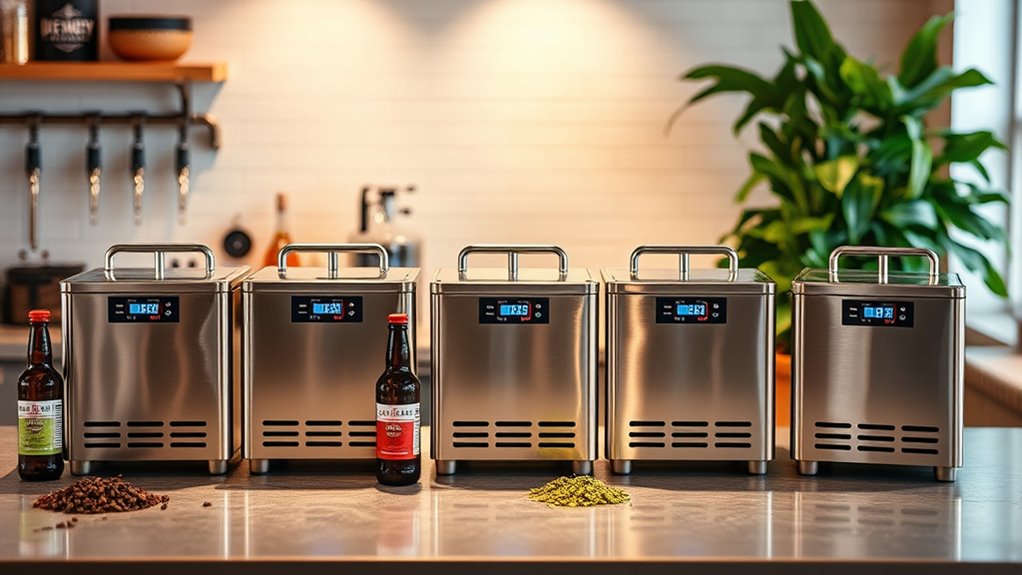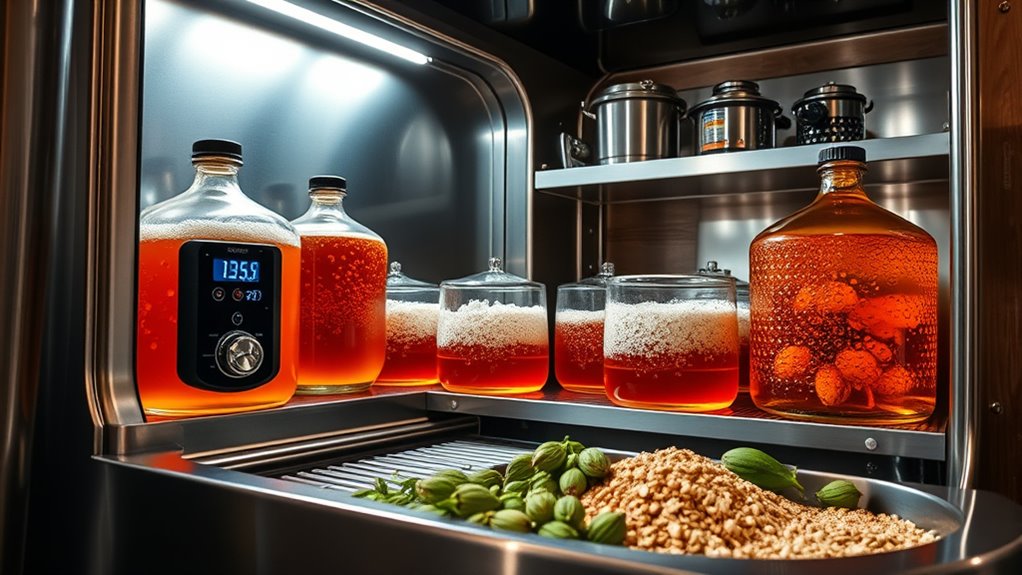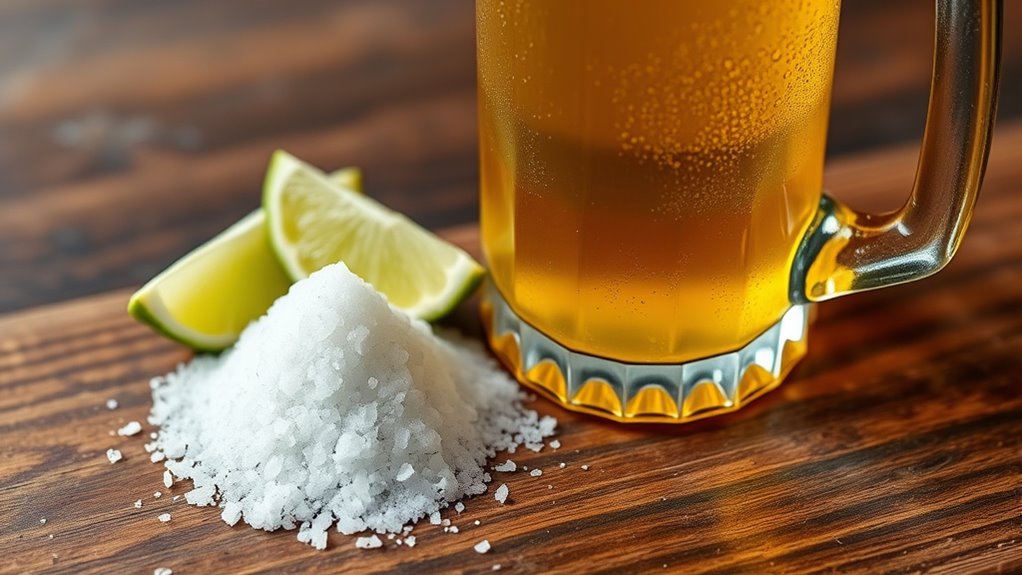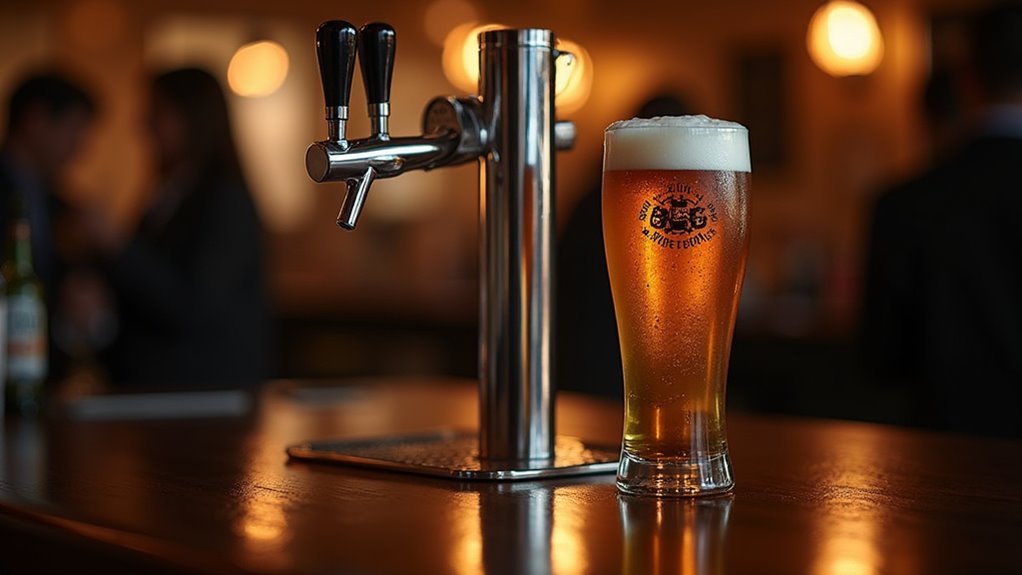In 2025, top glycol chillers for homebrewing include the VEVOR Glass Froster, which cools glasses rapidly, and the VEVOR Laboratory Chiller Circulator, known for its efficient temperature range and user-friendly display. The Home Brewing Fermentation Cooler 2.0 excels in versatility, while the 15ft Immersion Wort Chiller offers durability and performance. Finally, the YUEWO Copper Immersion Wort Chiller stands out for its efficient heat transfer. Each has unique features that enhance your brewing experience, helping you brew better beer. You’ll discover what factors to evaluate further.
At a Glance
- Look for glycol chillers with a temperature range of -5°C to 100°C for versatile brewing options and optimal fermentation control.
- Ensure the chiller has a sufficient capacity of around 6 liters for efficient cooling of low-temperature liquids used in homebrewing.
- Choose models with durable construction, such as 304 stainless steel, to ensure longevity and resistance to corrosion during brewing processes.
- Opt for user-friendly designs featuring clear LCD displays and plug-and-play setups for easy operation and monitoring.
- Consider compact and portable options that fit various fermenter sizes and are easy to clean for hassle-free maintenance.
VEVOR Glass Froster Chiller for Drinks
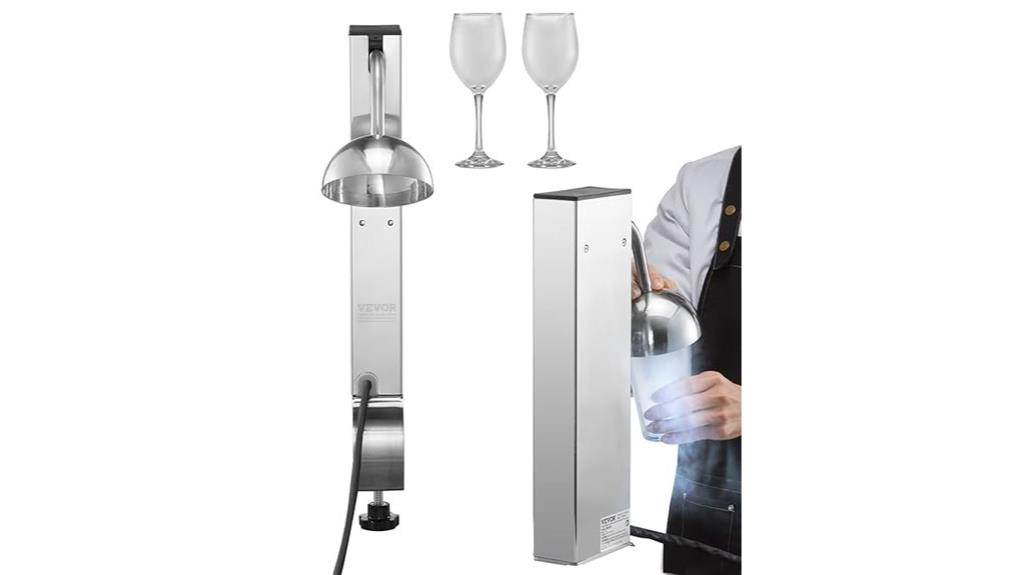
The VEVOR Glass Froster Chiller is an excellent choice for homebrewers and bar enthusiasts who want to serve perfectly chilled beverages without the dilution that ice can cause. This innovative device uses dry ice to chill your glass in just 8-10 seconds, allowing for rapid cooling. You can enjoy various drinks, from wine to cocktails, while preserving their original flavor and concentration. The user-friendly design makes it ideal for home kitchens or bar counters, though some users report minor leakage. Overall, it offers great value compared to similar products, ensuring your drinks stay perfectly chilled and flavorful.
Best For: Bar enthusiasts and homebrewers looking to serve perfectly chilled beverages without dilution.
Pros:
- Rapid cooling: Chills glasses in just 8-10 seconds using dry ice.
- Flavor preservation: Maintains the original taste and concentration of beverages without ice dilution.
- Versatile use: Suitable for a wide range of drinks, including wine, cocktails, and juices.
Cons:
- Minor leakage: Some users report issues with leakage during operation.
- Requires dry ice: Need to purchase dry ice regularly for optimal performance.
- Space limitations: While compact, it may still take up valuable counter space in smaller kitchens.
VEVOR Laboratory Chiller Circulator
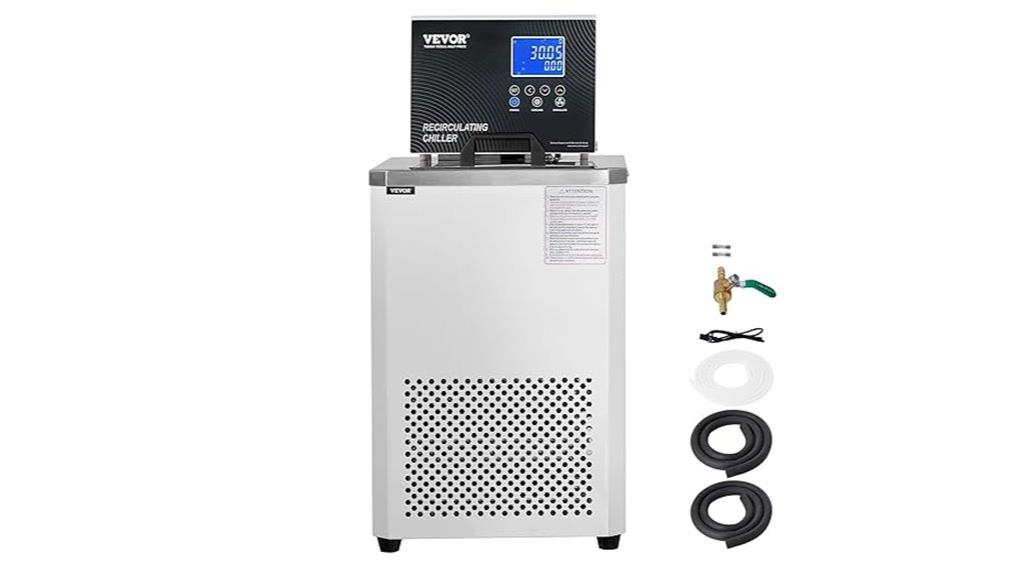
For those seeking precise temperature control in their homebrewing process, the VEVOR Laboratory Chiller Circulator stands out as an excellent choice. It offers a temperature range from -5°C to 100°C, making it versatile for various brewing needs. With a 6L capacity and a high-definition LCD display, you can easily monitor and adjust settings. Its efficient compressors and silent operation guarantee stable cooling. The dual circulation system allows for both small and large-scale applications. Made from durable 304 stainless steel, it resists corrosion. Users appreciate its accuracy and ease of use, making it a reliable addition to your brewing setup.
Best For: Homebrewers and laboratory professionals seeking precise and efficient temperature control for their experiments and brewing processes.
Pros:
- High temperature accuracy with a 0.01°C resolution for precise control.
- Durable construction using 304 stainless steel, ensuring longevity and corrosion resistance.
- Dual circulation system allows for flexibility in both small and large-scale applications.
Cons:
- The 6L capacity may be limiting for larger brewing or laboratory setups.
- Some users may find the initial setup and calibration process requires attention to detail.
- While silent, it may still produce some noise during operation, which could be a concern for noise-sensitive environments.
Home Brewing Fermentation Cooler 2.0
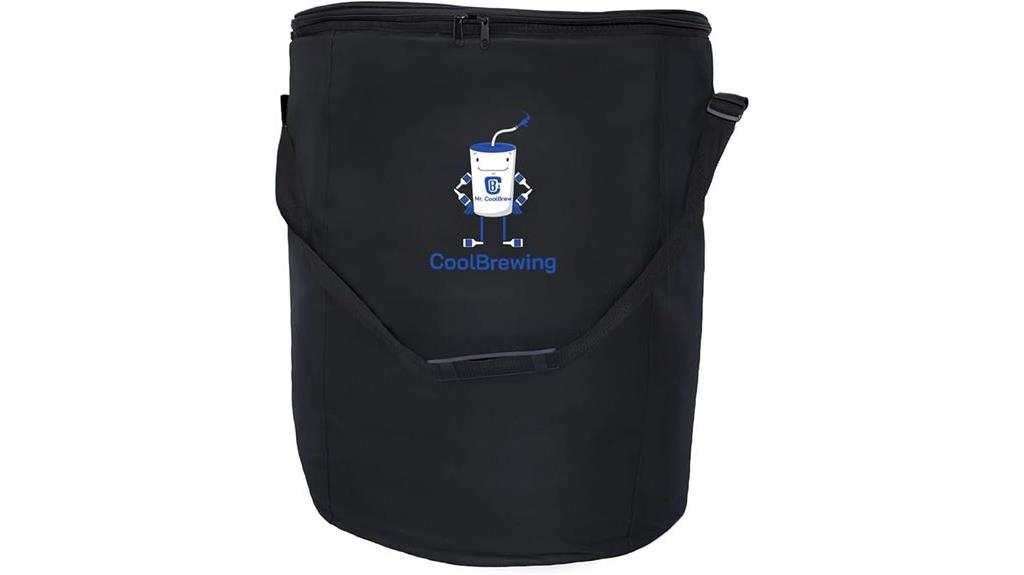
If you’re a homebrewer looking to achieve precise temperature control during fermentation, the Home Brewing Fermentation Cooler 2.0 is an excellent choice. This versatile cooler fits various fermenters and kegs, making it suitable for different brewing styles. With a cooling efficiency that can drop temperatures up to 30°F below ambient, it guarantees peak fermentation conditions for your brews. The waterproof and insulated design minimizes messy blowouts, while the collapsible feature makes it ideal for small spaces. Users praise its ease of use and significant improvements over traditional methods, making it a reliable tool for quality homebrewing.
Best For: Homebrewers seeking precise temperature control for fermentation in various brewing styles and limited spaces.
Pros:
- Versatile Compatibility: Fits a wide range of fermenters and kegs, accommodating different brewing needs.
- Effective Temperature Regulation: Can achieve significant temperature drops, ensuring optimal fermentation conditions.
- Space-Saving Design: Collapsible and portable, making it ideal for small areas and easy to store.
Cons:
- Requires Frozen Bottles: Cooling efficiency depends on having frozen 2-liter bottles, which may require additional planning.
- Limited Capacity: Best for up to 8-gallon fermenters, which may not suit larger brewing batches.
- Initial Setup Time: Users may need to experiment with bottle quantities and placement for optimal performance.
15ft Immersion Wort Chiller for Home Brewing
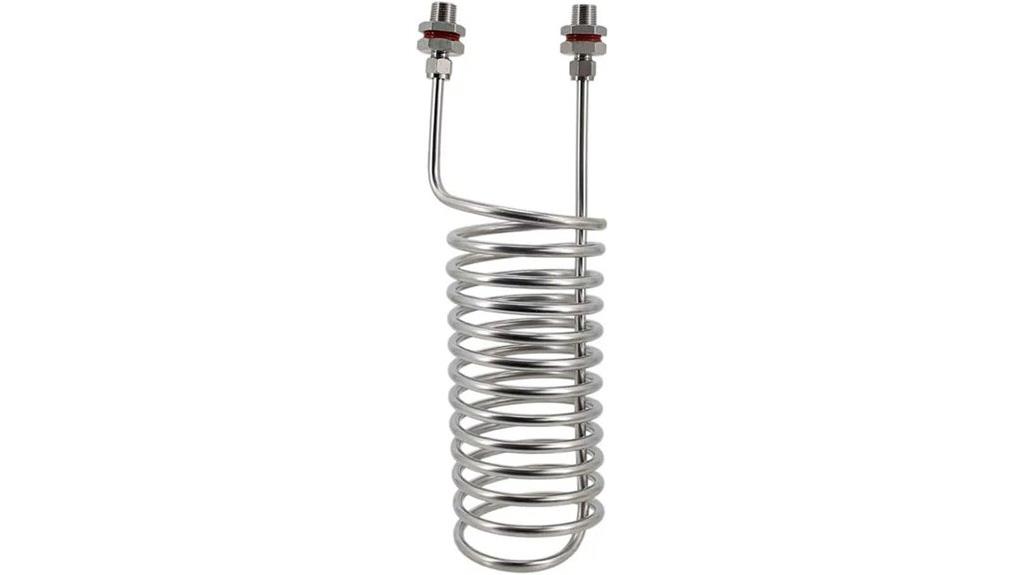
Homebrewers looking for efficient temperature control during the brewing process will find the 15ft Immersion Wort Chiller an excellent choice. Made from durable 304 stainless steel, this chiller guarantees long-lasting performance and resistance to corrosion. Its 15-foot coil length allows it to effectively cool or heat wort, making it versatile for various brewing needs. It’s compatible with both stainless steel and plastic fermenters that have openings of 130mm or larger. Weighing only 1.76 ounces, it’s easy to handle. Customizable solutions are available, allowing you to tailor the chiller to your specific brewing requirements.
Best For: Homebrewers seeking efficient temperature control and customizable solutions for their brewing process.
Pros:
- Durable Construction: Made from 304 stainless steel for long-lasting performance and corrosion resistance.
- Versatile Functionality: Suitable for both heating and cooling, making it ideal for various brewing needs.
- Lightweight and Easy to Handle: Weighs only 1.76 ounces, allowing for convenient use during brewing.
Cons:
- Limited Compatibility: Requires fermenters with openings of 130mm or larger, which may not suit all setups.
- Customizable Solutions May Incur Extra Costs: Tailoring the chiller to specific needs could lead to additional expenses.
- Size Considerations: The 15ft coil length may be cumbersome for smaller brewing spaces.
YUEWO Copper Immersion Wort Chiller Coil for Homebrew
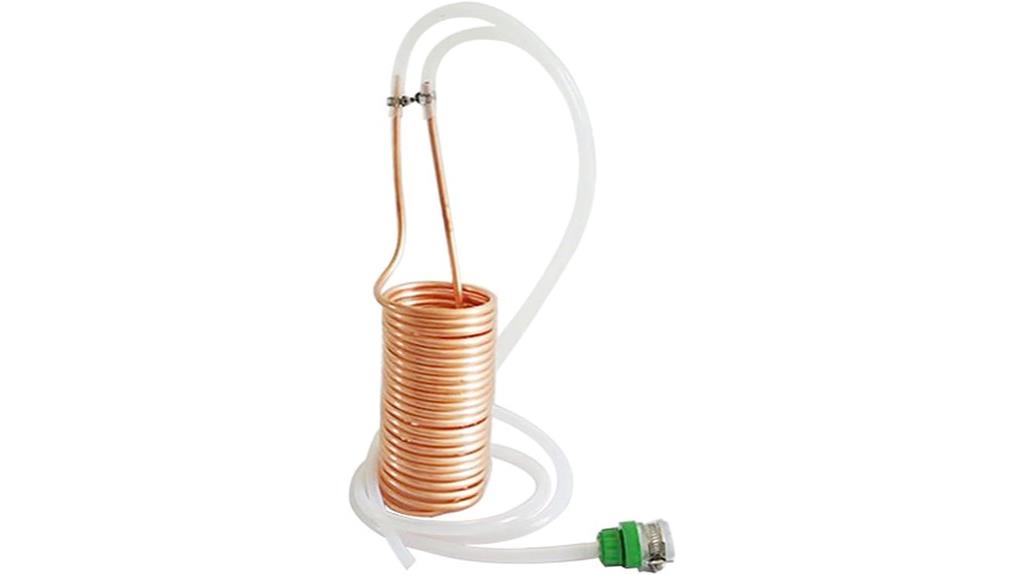
The YUEWO Copper Immersion Wort Chiller Coil is an excellent choice for those looking to achieve rapid cooling of their wort, ensuring it reaches the ideal temperature for yeast addition. With a length of 26 feet, this chiller efficiently transfers heat, making it suitable for all seasons. It includes two pieces of vinyl tubing and a garden hose fitting, allowing for easy connection to your water source. Weighing 3.87 pounds, it’s portable and easy to clean. Customers appreciate its reliable performance, reflected in a solid 4.7-star rating, making it one of the top options for homebrewing enthusiasts.
Best For: Homebrewing enthusiasts looking for an efficient and reliable wort chiller to quickly cool their wort for yeast addition.
Pros:
- High performance with rapid cooling capabilities for optimal fermentation.
- Easy to connect to various water sources, including garden hoses and laundry sinks.
- Lightweight and portable design makes it convenient to use and clean.
Cons:
- Limited customer ratings may not provide a comprehensive view of long-term performance.
- Requires a water source nearby, which may not be accessible for all brewing setups.
- The copper material may require regular maintenance to prevent oxidation.
Factors to Consider When Choosing Glycol Chiller Homebrew
When choosing a glycol chiller for homebrewing, it’s crucial to take into account several key factors. You’ll want to look at cooling efficiency ratings, temperature control range, and material durability to guarantee peak performance. Additionally, size, capacity, and ease of use play significant roles in selecting the right unit for your brewing needs.
Cooling Efficiency Ratings
Choosing the right glycol chiller for your homebrewing setup involves understanding cooling efficiency ratings, as these ratings reveal how effectively a chiller can manage temperature control during fermentation. Look for models that can achieve temperature drops of 30°F below ambient conditions. The best chillers maintain stable fermentation temperatures, which is vital for brewing high-quality beer. High-quality compressors and circulating pumps contribute to rapid cooling and consistent performance across different brewing applications. Additionally, precise temperature control is essential, with some chillers offering accuracy to 0.01°C. Finally, consider how compatible the chiller is with various fermenter sizes and types, as this compatibility can greatly impact overall cooling efficiency and your brewing success.
Temperature Control Range
Understanding temperature control range is essential for selecting the right glycol chiller for your homebrewing needs. The ideal range typically spans from -5°C to 100°C (23°F to 212°F), giving you flexibility in fermentation and cooling processes. Effective chillers can achieve temperature drops of up to 30°F below ambient temperature, which is critical for different beer styles. Precision matters, too; some chillers offer accuracy up to 0.01°C, directly impacting your brew’s quality. Maintaining stable fermentation temperatures is important, especially for ales, which thrive between 68°F to 72°F (20°C to 22°C). Additionally, the ability to switch between cooling and heating modes enhances versatility, accommodating various brewing techniques and seasonal changes in temperature.
Material Durability
Selecting a glycol chiller for homebrewing requires careful consideration of material durability, as this directly affects performance and longevity. Start by evaluating corrosion resistance; 304 stainless steel is a popular choice for its durability and long-lasting performance. Copper is another excellent option, known for its superior heat conductivity and efficient heat transfer, ensuring quick cooling of your wort. It’s also essential to check that the chiller’s construction allows for easy cleaning, as residue buildup can hinder performance and sanitation. Additionally, the thickness of the material impacts insulation properties, important for stable fermentation temperatures. Finally, look for a robust design that can withstand varying temperatures and pressures, enhancing the chiller’s reliability and lifespan.
Size and Capacity
When you’re considering a glycol chiller for homebrewing, size and capacity play crucial roles in guaranteeing ideal performance. First, think about the size of your fermentation vessel. The chiller should accommodate fermenters with openings of at least 130mm in diameter. Look for models with a capacity of around 6 liters, which helps efficiently cool low-temperature liquids during fermentation. Additionally, verify the chiller fits comfortably in your brewing space; compact designs work well in limited areas while maintaining effective temperature control. Assess the cooling efficiency, aiming for a temperature drop of 10°F with frozen bottles or packs. Finally, choose a chiller compatible with various fermenter sizes to enhance your brewing flexibility, including options for up to 8 gallons or multiple smaller kegs.
Ease of Use
Choosing the right glycol chiller for homebrewing can greatly affect your brewing experience, so it’s crucial to evaluate ease of use. Look for chillers with a user-friendly design, featuring straightforward operation and intuitive controls. Clear temperature displays, such as LCD screens, help you monitor and adjust temperatures easily, guaranteeing peak fermentation. Opt for plug-and-play models to avoid complex setups or voltage adjustments, making them accessible for everyone. Evaluate the chiller’s portability and compactness, as a space-saving design enhances usability in limited brewing environments. Finally, check for easy-to-clean components to facilitate hassle-free maintenance, contributing to consistent performance over time. By considering these factors, you’ll find a chiller that simplifies your brewing process.
Compatibility With Equipment
After confirming your glycol chiller is easy to use, the next step involves evaluating its compatibility with your brewing equipment. First, check that your chiller connects well with fermenters that have openings of 130mm diameter or larger for ideal efficiency. It’s also vital to take into account the material of your fermenters; glycol chillers work with both stainless steel and plastic, making them versatile for various setups. Assess the temperature control range to verify it meets your fermentation needs. Additionally, confirm that the chiller’s cooling capacity aligns with your brewing system’s volume, especially if you’re handling larger batches or multiple fermenters. Finally, reflect on how easily it integrates with existing equipment, including hose fittings and circulation systems, for a seamless setup.
Maintenance and Cleaning
Maintaining your glycol chiller is essential for guaranteeing it operates efficiently and lasts a long time. Regularly check and replace the coolant to prevent contamination and maintain peak performance. Cleaning the chiller’s coils and components is vital for effective heat transfer, as buildup can hinder cooling efficiency. Periodically inspect and clean the pump and circulation system to guarantee consistent flow and prevent clogs. Use non-corrosive cleaning agents designed specifically for glycol systems to protect the chiller’s materials. Additionally, keep the area around the glycol chiller clean and free from debris. This helps prevent external contaminants from entering the system during operation, contributing to the longevity and reliability of your chiller. Proper maintenance pays off in the long run.
Frequently Asked Questions
How Do Glycol Chillers Compare to Traditional Refrigeration Methods?
Glycol chillers offer several advantages over traditional refrigeration methods. They provide precise temperature control, which is essential for processes like fermentation. Unlike conventional systems, glycol chillers circulate a chilled glycol solution, ensuring even cooling throughout. This method is generally more energy-efficient and can handle larger volumes. Additionally, glycol chillers are less prone to temperature fluctuations, making them ideal for long brewing sessions. Overall, they enhance consistency and quality in homebrewing operations.
Are Glycol Chillers Energy-Efficient for Home Use?
Yes, glycol chillers can be energy-efficient for home use. They operate by utilizing a glycol solution that circulates through your brewing system, maintaining consistent temperatures. Compared to traditional methods, glycol chillers often consume less energy due to their precise temperature control, reducing the workload on the compressor. This efficiency can lead to lower energy bills over time. However, the initial investment might be higher, so consider your brewing needs before deciding.
What Maintenance Is Required for Glycol Chillers?
Glycol chillers require regular maintenance to guarantee peak performance. You should check the glycol level periodically and top it off as needed. Cleaning the condenser coils every few months helps maintain efficiency. Inspect the pump and connections for leaks or wear, and replace any faulty components. Additionally, regularly monitor the temperature settings and make adjustments if necessary. Following these steps will prolong the lifespan of your glycol chiller and improve its efficiency.
Can Glycol Chillers Be Used for Other Beverages Besides Beer?
Yes, glycol chillers can be used for other beverages besides beer. They effectively regulate temperatures for wine, cider, and kombucha brewing. By maintaining consistent cooling, they help guarantee the quality and flavor of these beverages during fermentation and storage. You’ll find that glycol chillers can also be beneficial for soft drink and juice production, providing precise temperature control that enhances the overall brewing process across various types of beverages.
What Is the Average Lifespan of a Glycol Chiller?
The average lifespan of a glycol chiller is typically around 10 to 15 years, depending on usage and maintenance. If you regularly clean and service it, you can extend its life. Factors like the environment, frequency of use, and quality of the unit also play significant roles. Keep an eye on its performance, and don’t hesitate to address any issues promptly to maximize its durability and efficiency in your brewing setup.
